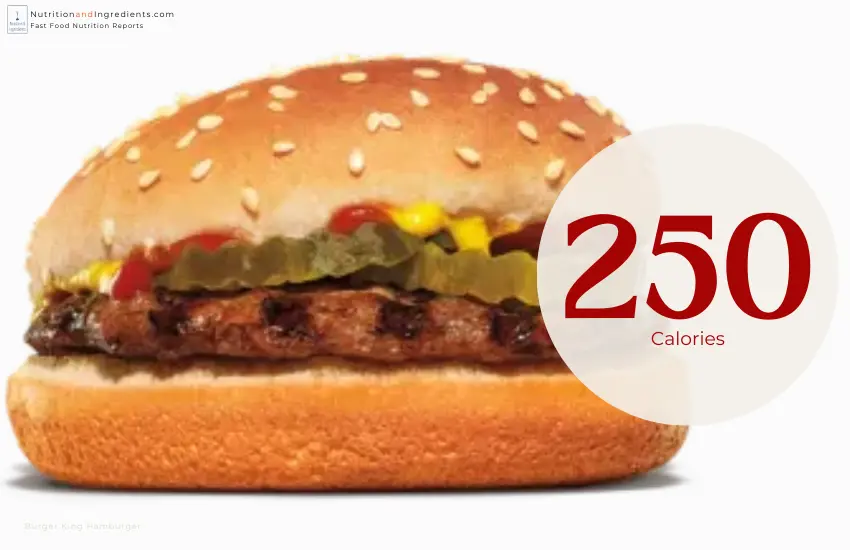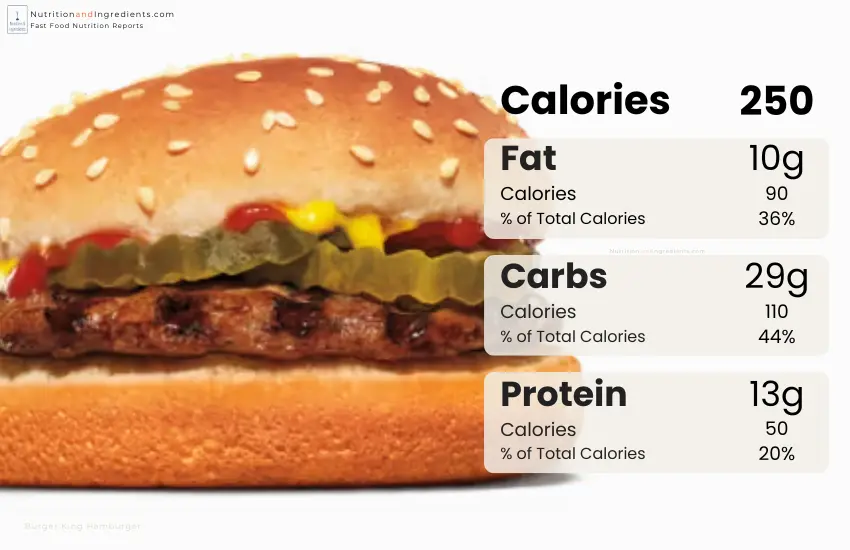Burger King Hamburger

The Burger King hamburger is made with a flame-grilled beef patty, pickles, mustard and ketchup, then served on a toasted sesame seed bun.
There are 250 calories, 10 grams fat, 29 grams carbohydrates, and 13 grams carbohydrates in one hamburger.
Read this report for a complete review of the nutrition facts, ingredients, and allergens in a classic hamburger from Burger King.
Burger King Hamburger Nutritional Info
Nutrition facts are based on a standard serving of one hamburger with pickles, mustard, and ketchup.
Calories
There are 250 calories in a standard Burger King hamburger.
Here is a summary of calories by macronutrient, per serving:
Carbohydrates make up about 44% of the total calories. Dietary fats contribute 36% of the calories, and the remaining 20% is derived from protein.
Burger King Hamburger
% calories from fat, carbs and proteinCalories by nutrient are rounded estimates based on the nutrition facts information provided by Burger King fast food restaurant. Actual calories may vary a result of how the burger is prepared onsite.
FITNESS TIME TO BURN 250 CALORIES
Estimate based on moderate level of activity by an adult with average BMI.

Nutrition Facts
Amount (%DV) per Burger
Red indicates a high %DV.
|
Calories |
250 | |
|
%DV | ||
|
Total Fat |
10g |
13% |
|
Saturated Fat |
4g |
20% |
|
Trans Fat |
0g | |
|
Cholesterol |
30mg |
10% |
|
Sodium |
560mg |
24% |
|
Carbohydrates |
29g |
11% |
|
Dietary Fiber |
1g |
4% |
|
Total Sugars |
7g | |
|
Protein |
13g |
%DV based on a 2,000 calorie diet. Calorie needs vary and your %DV may be higher or lower. Provided for informational purposes only. Consult with your physician for dietary or healthcare advice.
Dietary Fats
One hamburger contains 10 grams of fat, including 4 grams of saturated fat.
Dietary Guidelines for Americans recommend limiting calories from saturated fat to less than 10% of total calories.
With that in mind, it’s important to know that this one hamburger contributes a 20% daily value (%DV) of saturated fat. That is considered high.
To calculate %DV, divide the amount of a nutrient in one serving by the FDA-recommended daily limit.
|
per Serving |
Daily Limit* |
Daily Value | |
|
Total Fat |
10g |
78g |
13% |
|
Saturated Fat |
4g |
20g |
20% |
*Based on FDA general nutrition advice for adult following 2,000 calorie daily diet.
SUMMARY OF FAT PER SERVING
Sodium
Burger King’s hamburger has 560 milligrams of sodium. That’s nearly one quarter of the total recommended daily value.
According to the U.S Food & Drug Administration, sodium is a “nutrient to get less of.” Studies have shown that diets high in sodium are associated with an elevated risk of health concerns that can result from high blood pressure.

Compare the amount of sodium in Wendy’s Jr. Hamburger.
Ingredients and Allergens
Here is the list of ingredients in a Burger King hamburger.
Ingredients
|
Patty |
|
Beef |
|
Sesame Seed Bun |
|
Unbleached Enriched Flour, Water, Sugar and/or Liquid Sugar (water, sugar), Soybean Oil, Yeast, Salt, Wheat Gluten, Yeast Food, Dough Conditioners, Guar Gum, Enzymes, Milled Flaxseed, Maltodextrin, Ascorbic Acid, Cultured Wheat Flour, Soy Lecithin, Sesame Seeds |
|
Pickles |
|
Pickles, Water, Distilled Vinegar, Salt |
|
Ketchup |
|
Tomato Concentrate (red ripe tomatoes), Distilled white vinegar, Sugar, Salt, Natural Flavoring, Onion Powder, Spice |
|
Mustard |
|
Distilled White Vinegar, Water, Mustard Seed, Mustard Bran, Salt, Tumeric, Spices |
Allergens
The hamburger from Burger King is made with sesame, soy, and wheat.
Check the list of disclosed allergens in Burger King menu items.
Fast Food Hamburgers Nutrition
Here is a chart comparing the nutrition facts in select hamburgers from popular fast food restaurants.
<< Swipe table right to left for more nutrition facts
| Restaurant | Menu Item | Calories | Fat | Carbs | Protein | Sodium |
|---|---|---|---|---|---|---|
| Burger King | Hamburger | 250 | 10g | 29g | 13g | 560mg |
| McDonald's | Hamburger | 250 | 9g | 30g | 12g | 510mg |
| Wendy's | Jr. Hamburger | 230 | 10g | 24g | 12g | 470mg |
| Whataburger | Hamburger | 590 | 25g | 62g | 29g | 1220mg |
| Burger King | Impossible Whopper | 630 | 32g | 62g | 28g | 1350mg |
| Shake Shack | Veggie Shack | 630 | 31g | 53g | 20g | 1630mg |
| Burger King | Whopper | 670 | 39g | 54g | 31g | 1170mg |
| Five Guys | Bacon Burger | 780 | 50g | 39g | 43g | 690mg |
| Five Guys | Hamburger | 840 | 43g | 39g | 39g | 430mg |
| Whataburger | Double Meat Burger | 835 | 44g | 62g | 47g | 1470mg |
Nutrition facts, prices, and ingredients are based on available information as of the date of publication. Restaurants and food manufacturers may change recipes or formulations without notice. Check package labels and ask the product manufacturer or restaurant for the most up-to-date information. Unless otherwise stated, %DV is based on a 2,000 calorie diet. All reports and reviews published on this site are for informational purposes only. NutritionandIngredients.com does not provide healthcare advice or dietary recommendations. Always consult your licensed physician for any healthcare or dietary advice.
Nutrition facts and allergens source: Burger King. Hamburger product image courtesy of Burger King. Designs by Nutrition & Ingredients for purposes of research and commentary related to fast food nutrition reports.
